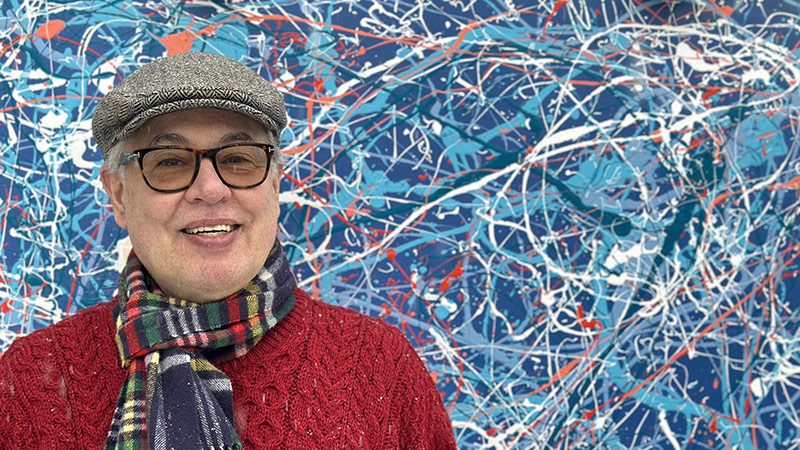How Eric Weissman, once homeless, finds healing and connection through art
Author: Hilary Creamer Robinson
Posted on Jan 18, 2024
Category: UNB Saint John

Photo credit: Hilary Creamer Robinson
The walls of Eric Weissman’s Rothesay home are covered with his bold and energetic abstract artwork. In the past year, the University of New Brunswick (UNB) professor’s paintings have also begun adding colour and spirit to his colleagues’ offices within UNB Saint John’s faculty of arts.
Weissman is equal parts academic and artist. A lived-experience scholar who studies what he once lived through – homelessness, addiction and mental health challenges – he grew up surrounded by practicing artists. He says creating and giving away his work is key to his recovery.
“I like giving my art away,” said Weissman. “It’s a way for me to give back a small piece of everything I took when I was an addict. Besides, I almost need to because I could work on each piece forever.”
The associate professor’s artistic roots are firmly planted in his hometown of Toronto, where his mother, the revered and provocative Canadian artist, Claire Weissman Wilks, encouraged her son to pursue whatever interests captured his imagination.
With strong ties to the city’s vibrant arts scene, he paid for his 1980s university tuition by selling hand painted t-shirts and canvasses influenced by the work of family friend and Canadian modernism pioneer, William Ronald.
While Weissman’s coveted hand-made t-shirts were paying for his doctorate in sociology, he began partying too much and soon developed a severe addiction to drugs and alcohol. He quit his doctoral program at the University of Toronto and became all but estranged from friends and family.
By the early 1990s, Weissman was living on welfare and moving in and out of homelessness.
After several years living in this pattern, with the support of his sister, he entered a 10-month rehab program. As part of his recovery process, Weissman, wrote extensively about homelessness, addiction and recovery; scribing a chronicle of his time in rehab.
Returning to the world sober in the summer of 1996, Weissman formed specialty artwork company, Dramatic Finishes, creating striking abstract murals of Venetian plaster in private homes and corporate buildings around Toronto.
As his healing progressed, he developed a film series on Toronto’s street life, and a 10-year visual study on the unhoused residents of Tent City.
Soon, he felt the desire to return to academia to complete his doctoral studies in sociology.
“I wanted to reclaim that part of my identity,” Weissman said, this time bringing with him an immensely valuable perspective and deep insight into the study and research of homelessness, housing, mental health and substance abuse.
Twenty-eight years later, he remains devoted to his life’s work, grounded in his own experiences.
For much of this time, Weissman’s art took a backseat to his research. And for more than 10 years, he didn’t touch a canvas. In 2018, he joined UNB’s Saint John campus faculty of arts and began creating a life in New Brunswick.
He got a house, almost exactly 25 years to the day he went into rehab the first time, and rescued a black lab named Carbon, who is his best companion.
But when the pandemic forced the world into isolation, the artist-cum-academic, who lives alone, found consolation and an emotional outlet in his old friends: wet, glossy paint; stretched blank canvases; brushes in all sizes; tools and tape.
During the lonely, early spring months of 2020, like paint spilling from a tipped vessel, Weissman’s floodgates opened.
Since then, he has produced enough artwork to cover every wall inside his home and even some outside – that now, during the dark days of winter, are framed with pretty strings of lights.
“A big part of my recovery is giving art away,” said Weissman, who regularly gifts his oversized works to friends and colleagues, new and old.
Now 28 years sober, Weissman describes his artistic process as highly physical. He lays canvases on the floor of his basement studio, pouring onto them streams of paint, then shifting them in dictation with his mood; colours blending and bending into bright rivers of movement.
“I don’t know a lot about art,” he says, “but I’m an artist. I always want to paint.”
Weissman estimates he’s given away between 20 and 25 of his paintings, many now housed in his colleagues’ offices. He has also donated large pieces of original art to Avenue B and Rose House in Saint John, and to Fredericton’s River Stone Recovery Centre.
“Eric’s an incredibly generous, open person,” said Heidi MacDonald, dean of arts on UNB’s Saint John campus. “He shares his experiences with homelessness and addiction with his students, and he shares his art with his colleagues. He has a deep goodness and has added so much to the faculty of arts and the university.”
Weissman, who finds inspiration and beauty in the every day, encourages those who are struggling with mental health and addiction to find, as he has, “a visceral connection between yourself and your pain. That’s what great art is,” he said.
